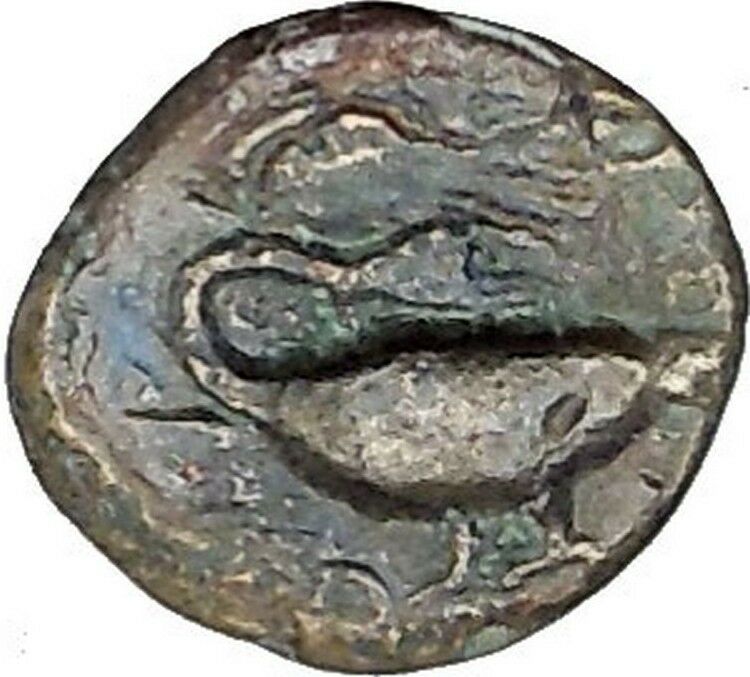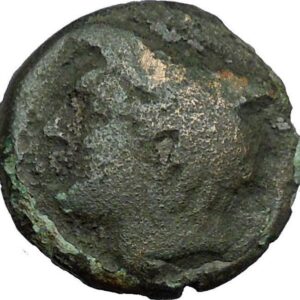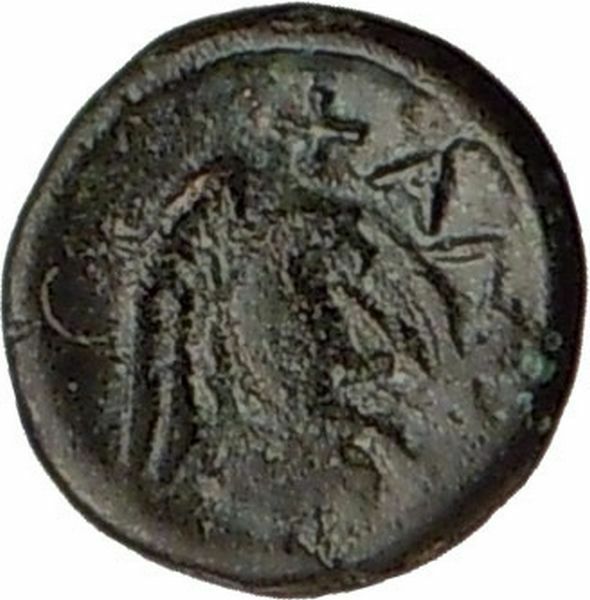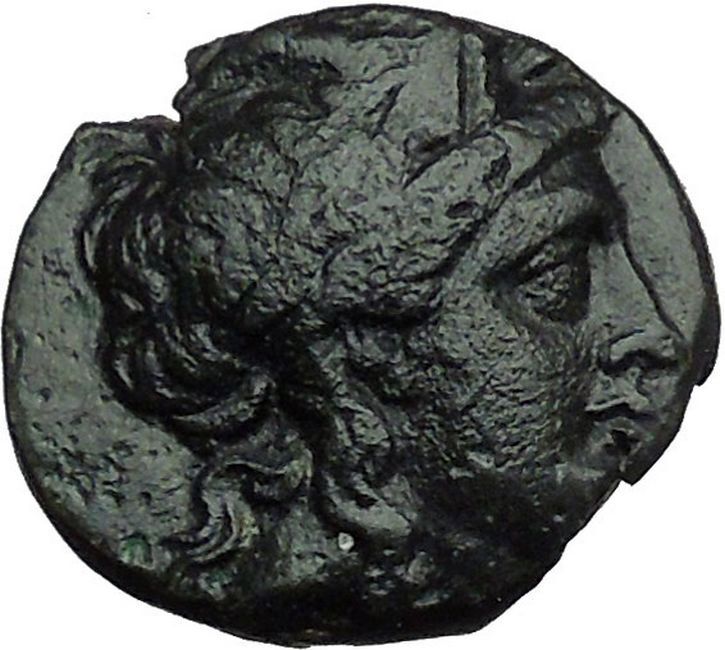|
Greek city of
Thessalonica
in
Macedonia
Bronze 17mm (5.59 grams) Struck 158-149 B.C.
Reference: Sear 1467; B.M.C. 5. 19
Head of Athena right, wearing richly ornamented crested helmet.
ΘEΣΣAΛO / NIKHΣ – Bull grazing right.
You are bidding on the exact item pictured,
provided with a Certificate of Authenticity and Lifetime Guarantee of
Authenticity.
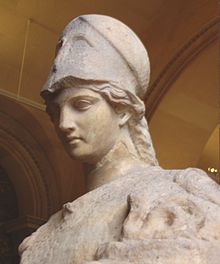
Helmeted Athena with the cista and Erichthonius in his serpent form.
Roman, first century (Louvre
Museum)
In
Greek religion
and
mythology
, Athena or Athene, also
referred to as Pallas Athena/Athene , is the goddess of wisdom, courage,
inspiration, civilization, law and justice, just warfare, mathematics, strength,
strategy, the arts, crafts, and skill.
Minerva
is the
Roman goddess
identified with
Athena.
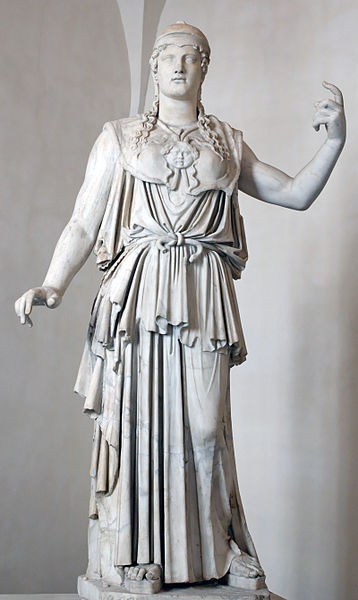
Athena is also a shrewd companion of
heroes and is the
goddess
of heroic endeavour. She is the
virgin
patroness of
Athens
. The Athenians founded the
Parthenon
on the Acropolis of her namesake
city, Athens (Athena Parthenos), in her honour.
Athena’s veneration as the patron of Athens seems to have existed from the
earliest times, and was so persistent that archaic myths about her were recast
to adapt to cultural changes. In her role as a protector of the city (polis),
many people throughout the Greek world worshiped Athena as Athena Polias
(Ἀθηνᾶ Πολιάς “Athena of the city”). The city of
Athens
and the goddess Athena essentially bear
the same name, “Athenai” meaning “[many] Athenas”.
Patroness

Athenian
tetradrachm
representing the
goddess Athena
Athena as the goddess of philosophy became an aspect of the cult in Classical
Greece during the late 5th century B.C. She is the patroness of various crafts,
especially of weaving
, as Athena Ergane, and was
honored as such at festivals such as
Chalceia
. The metalwork of weapons also fell
under her patronage. She led battles (Athena
Promachos or the warrior maiden Athena Parthenos) as the
disciplined, strategic side of war, in contrast to her brother
Ares, the patron of violence, bloodlust and slaughter—”the raw force
of war”. Athena’s wisdom includes the cunning intelligence (metis) of
such figures as Odysseus
. Not only was this version of Athena
the opposite of Ares in combat, it was also the polar opposite of the serene
earth goddess version of the deity, Athena Polias.
Athena appears in Greek mythology as the patron and helper of many heroes,
including Odysseus
,
Jason
, and
Heracles
. In
Classical Greek
myths, she never consorts with
a lover, nor does she ever marry,earning the title Athena Parthenos. A
remnant of archaic myth depicts her as the adoptive mother of
Erechtheus
/Erichthonius
through the foiled rape by
Hephaestus
. Other variants relate that
Erichthonius, the serpent that accompanied Athena, was born to
Gaia
: when the rape failed, the semen landed on
Gaia and impregnated her. After Erechthonius was born, Gaia gave him to Athena.
Though Athena is a goddess of war strategy, she disliked fighting without
purpose and preferred to use wisdom to settle predicaments.The goddess only
encouraged fighting for a reasonable cause or to resolve conflict. As patron of
Athens she fought in the Trojan war on the side of the Achaeans.
Mythology
Lady of Athens
Athena competed with
Poseidon
to be the patron deity of Athens,
which was yet unnamed, in a version of one
founding myth
. They agreed that each would give
the Athenians one gift and that the Athenians would choose the gift they
preferred. Poseidon struck the ground with his
trident
and a salt water spring sprang up; this
gave them a means of trade and water—Athens at its height was a significant sea
power, defeating the
Persian
fleet at the
Battle of Salamis
—but the water was salty and
not very good for drinking.
Athena, however, offered them the first domesticated
olive tree
. The Athenians (or their king,
Cecrops
) accepted the olive tree and with it
the patronage of Athena, for the olive tree brought wood, oil, and food.
Robert Graves
was of the opinion that
“Poseidon’s attempts to take possession of certain cities are political myths”
which reflect the conflict between matriarchal and patriarchal religions.
Other sites of cult
Athena also was the patron goddess of several other Greek cities, notably
Sparta, where the archaic cult of
Athena Alea
had its sanctuaries in the
surrounding villages of
Mantineia
and, notably,
Tegea
. In Sparta itself, the temple of Athena
Khalkíoikos (Athena “of the Brazen House”, often
latinized
as Chalcioecus) was the
grandest and located on the Spartan acropolis; presumably it had a roof of
bronze. The forecourt of the Brazen House was the place where the most solemn
religious functions in Sparta took place.
Tegea was an important religious center of ancient Greece, containing the
Temple of Athena Alea
. The temenos was founded by
Aleus
,
Pausanias
was informed. Votive bronzes at the
site from the Geometric and Archaic periods take the forms of horses and deer;
there are
sealstone
and
fibulae
. In the Archaic period the nine
villages that underlie Tegea banded together in a
synoecism
to form one city. Tegea was listed in
Homer
‘s
Catalogue of Ships
as one of the cities that
contributed ships and men for the
Achaean assault on Troy
.
Judgment of Paris

Aphrodite is being surveyed by Paris, while Athena (the leftmost
figure) and Hera stand nearby.
El Juicio de Paris
by
Enrique Simonet
, ca. 1904
All the gods and goddesses as well as various mortals were invited to the
marriage of Peleus
and
Thetis
(the eventual parents of
Achilles
). Only
Eris
, goddess of discord, was not invited. She
was annoyed at this, so she arrived with a golden apple inscribed with the word
καλλίστῃ (kallistēi, “for the fairest”), which she threw among the goddesses.
Aphrodite, Hera, and Athena all claimed to be the fairest, and thus the rightful
owner of the apple.
The goddesses chose to place the matter before Zeus, who, not wanting to
favor one of the goddesses, put the choice into the hands of Paris, a
Trojan prince. After bathing in the spring of
Mount Ida
(where Troy was situated), the
goddesses appeared before Paris. The goddesses undressed and presented
themselves to Paris naked, either at his request or for the sake of winning.

Paris is awarding the apple to Aphrodite, while Athena makes a face.
Urteil des Paris by
Anton Raphael Mengs
, ca. 1757
Still, Paris could not decide, as all three were ideally beautiful, so they
resorted to bribes. Hera tried to bribe Paris with control over all
Asia and Europe
, while Athena offered wisdom, fame and
glory in battle, but Aphrodite came forth and whispered to Paris that if he were
to choose her as the fairest he would have the most beautiful mortal woman in
the world as a wife, and he accordingly chose her. This woman was
Helen
, who was, unfortunately for Paris,
already married to King
Menelaus
of
Sparta
. The other two goddesses were enraged by
this and through Helen’s abduction by Paris they brought about the
Trojan War
.

The Parthenon
, Temple of Athena
Parthenos
Masculinity and
feminism
Athena had an “androgynous compromise” that allowed her traits and what she
stood for to be attributed to male and female rulers alike over the course of
history (such as Marie de’ Medici, Anne of Austria, Christina of Sweden, and
Catherine the Great)
J.J. Bachofen advocated that Athena was originally a maternal figure stable
in her security and poise but was caught up and perverted by a patriarchal
society; this was especially the case in Athens. The goddess adapted but could
very easily be seen as a god. He viewed it as “motherless paternity in the place
of fatherless maternity” where once altered, Athena’s character was to be
crystallized as that of a patriarch.
Whereas Bachofen saw the switch to paternity on Athena’s behalf as an
increase of power, Freud on the contrary perceived Athena as an “original mother
goddess divested of her power”. In this interpretation, Athena was demoted to be
only Zeus’s daughter, never allowed the expression of motherhood. Still more
different from Bachofen’s perspective is the lack of role permanency in Freud’s
view: Freud held that time and differing cultures would mold Athena to stand for
what was necessary to them.
The city Thessalonica in Macedonia
was founded around
315 BC
by the
King
Cassander of Macedon
, on or near the site of the ancient town of
Therma
and
twenty-six other local villages. He named it after his wife
Thessalonike
, a half-sister of
Alexander the Great
. She gained her name (“victory of Thessalians”: Gk
nikē
“victory”) from her father,
Philip II
, to commemorate her birth on the day of his gaining a victory over
the
Phocians
, who were defeated with the help of
Thessalian
horsemen, the best in Greece at that time. Thessaloniki developed
rapidly and as early as the
2nd
century BC
the first walls were built, forming a large square. It was an
autonomous part of the Kingdom of
Macedon
, with its own parliament where the King was represented and could
interfere in the city’s domestic affairs.
Roman
era
After the fall of the kingdom of Macedon in
168 BC
,
Thessalonica became a city of the
Roman Republic
. It grew to be an important trade-hub located on the
Via
Egnatia
, the
Roman road
connecting
Byzantium
(later
Constantinople
), with
Dyrrhachium
(now Durrës
in
Albania
), and
facilitating trade between Europe and Asia. The city became the capital of one
of the four Roman districts of Macedonia; it kept its privileges but was ruled
by a praetor
and had a Roman garrison, while for a short time in the
1st
century BC
, all the Greek provinces came under Thessalonica (the Latin form
of the name). Due to the city’s key commercial importance, a spacious harbour
was built by the Romans, the famous Burrowed Harbour (Σκαπτός Λιμήν) that
accommodated the town’s trade up to the eighteenth century; later, with the help
of silt deposits from the river
Axios
, it was
reclaimed as land and the port built beyond it. Remnants of the old harbour’s
docks can be found in the present day under Odos Frangon Street, near the
Catholic Church.
Thessaloniki’s
acropolis
,
located in the northern hills, was built in
55 BC
after
Thracian
raids in the city’s outskirts, for security reasons.
The city had a
Jewish
colony, established during the
first
century
, and was to be an early centre of
Christianity
. On his second missionary journey,
Paul
of Tarsus
, born a Hellenized Israelite, preached in the city’s synagogue,
the chief synagogue of the Jews in that part of Thessaloniki, and laid the
foundations of a church. Other Jews opposed to Paul drove him from the city, and
he fled to
Veroia
. Paul wrote two of his
epistles
to the Christian community at Thessalonica, the
First Epistle to the Thessalonians
and the
Second Epistle to the Thessalonians
.
Thessaloníki acquired a patron saint,
St. Demetrius
, in 306. He is credited with a number of miracles that saved
the city, and was the Roman
Proconsul
of Greece under the anti-Christian emperor
Maximian
,
later martyred at a Roman prison where today lies the
Church of St. Demetrius
, first built by the Roman sub-prefect of
Illyricum
Leontios in 463. Other important remains from this period include
the
Arch and Tomb of Galerius
, located near the centre of the modern city.
Macedonia or Macedon (from
Greek
: Μακεδονία,
Makedonía) was an
ancient Greek kingdom
. The kingdom, centered in the
northeastern part of the
Greek peninsula
, was bordered by
Epirus
to the west,
Paeonia
to the north, the region of
Thrace
to the east and
Thessaly
to the south. The
rise of Macedon
, from a small kingdom at the
periphery of
Classical Greek
affairs, to one which came to
dominate the entire Hellenic world, occurred under the reign of
Philip II
. For a brief period, after the
conquests of
Alexander the Great
, it became the most
powerful state in the world, controlling a territory that included the former
Persian empire
, stretching as far as the
Indus River
; at that time it inaugurated the
Hellenistic period
of
Ancient Greek civilization
.
Name
The name Macedonia (Greek:
Μακεδονία,
Makedonía) comes from the
ancient Greek word μακεδνός (Makednos).
It is commonly explained as having originally meant “a tall one” or
“highlander”, possibly descriptive of the
people
. The shorter English name variant
Macedon developed in Middle English, based on a borrowing from the French
form of the name, Macédoine.
History
Early history and
legend
The lands around
Aegae
, the first Macedonian capital, were home
to various peoples. Macedonia was called Emathia (from king Emathion) and the
city of Aiges was called Edessa, the capital of fabled king
Midas
in his youth. In approximately 650 BC,
the Argeads
, an ancient Greek royal house led by
Perdiccas I
established their palace-capital at
Aegae.
It seems that the first
Macedonian
state emerged in the 8th or early
7th century BC under the Argead Dynasty, who, according to legend, migrated to
the region from the Greek city
of
Argos
in Peloponnesus (thus the name Argead).
Herodotus mentions this
founding myth
when
Alexander I
was asked to prove his Greek
descent in order to participate in the
Olympic Games
, an athletic event in which only
men of Greek origin were entitled to participate. Alexander proved his (Argead)
descent and was allowed to compete by the
Hellanodikai
: “And that these descendants of
Perdiccas are Greeks, as they themselves say, I happen to know myself, and not
only so, but I will prove in the succeeding history that they are Greeks.
Moreover the Hellanodicai, who manage the games at Olympia, decided that they
were so: for when Alexander wished to contend in the games and had descended for
this purpose into the arena, the Greeks who were to run against him tried to
exclude him, saying that the contest was not for Barbarians to contend in but
for Greeks: since however Alexander proved that he was of Argos, he was judged
to be a Greek, and when he entered the contest of the foot-race his lot came out
with that of the first.” The Macedonian tribe ruled by the Argeads, was itself
called Argead (which translates as “descended from Argos”).
Other founding myths served other agenda: according to Justin’s, Epitome
of the Philippic History of
Pompeius Trogus
, Caranus, accompanied by a
multitude of Greeks came to the area in search for a new homeland took Edessa
and renamed it Aegae. Subsequently, he expelled Midas and other kings and formed
his new kingdom. Conversely, according to
Herodotus
, it was
Dorus, the son of Hellen
who led his people to
Histaeotis, whence they were driven off by the Cadmeians into Pindus, where they
settled as Macedonians. Later, a branch would migrate further south to be called
Dorians.
The kingdom was situated in the fertile alluvial plain, watered by the rivers
Haliacmon
and
Axius
, called Lower Macedonia, north of
the mountain
Olympus
. Around the time of
Alexander I of Macedon
, the Argead Macedonians
started to expand into
Upper Macedonia
, lands inhabited by independent
Macedonian tribes like the Lyncestae and the Elmiotae and to the West, beyond
Axius river, into Eordaia
,
Bottiaea
,
Mygdonia
, and
Almopia
, regions settled by, among others, many
Thracian tribes. To the north of Macedonia lay various non-Greek peoples such as
the
Paeonians
due north, the
Thracians
to the northeast, and the
Illyrians
, with whom the Macedonians were
frequently in conflict, to the northwest. To the south lay
Thessaly
, with whose inhabitants the
Macedonians had much in common both culturally and politically, while to west
lay Epirus
, with whom the Macedonians had a
peaceful relationship and in the 4th century BC formed an alliance against
Illyrian raids.
Near the modern city of
Veria
,
Perdiccas I
(or, more likely, his son,
Argaeus I
) built his capital, Aigai (modern
Vergina
). After a brief period under
Persian
rule under
Darius Hystaspes
, the state regained its
independence under King
Alexander I
(495–450
BC). In the
Peloponnesian War
Macedon was a secondary power
that alternated in support between Sparta and Athens.
Involvement in the Classical Greek world
Prior to the 4th century BC, the kingdom covered a region approximately
corresponding to the
Western
and
Central
parts of
province of Macedonia
in modern
Greece
. A unified Macedonian state was
eventually established by King
Amyntas III
(c.
393
–370 BC), though it still retained strong
contrasts between the cattle-rich coastal plain and the fierce isolated tribal
hinterland, allied to the king by marriage ties. They controlled the passes
through which barbarian invasions came from
Illyria
to the north and northwest. It became
increasingly
Atticised
during this period, though prominent
Athenians
appear to have regarded the
Macedonians as uncouth. Before the establishment of the
League of Corinth
, even though the Macedonians
apparently spoke a dialect of the Greek language and claimed proudly that they
were Greeks, they were not considered to fully share the
classical Greek
culture by many of the
inhabitants of the southern city states, because they did not share the
polis
based style of government.
Herodotus
, one of the foremost biographers in
antiquity who lived in Greece at the time when the Macedonian king
Alexander I
was in power, recorded:
“And that these descendants of Perdiccas are Hellenes, as they themselves
say, I happen to know myself, and not only so, but I will prove in the
succeeding history that they are Hellenes. Moreover the
Hellanodikai
, who manage the games at
Olympia, decided that they were so: for when
Alexander
wished to contend in the games
and had descended for this purpose into the arena, the Hellenes who were to
run against him tried to exclude him, saying that the contest was not for
Barbarians to contend in but for Hellenes: since however Alexander proved
that he was of Argos, he was judged to be a Hellene, and when he entered the
contest of the foot-race his lot came out with that of the first.”
Over the 4th century Macedon became more politically involved with the
south-central city-states of
Ancient Greece
, but it also retained more
archaic features like the palace-culture, first at Aegae (modern Vergina) then
at Pella
, resembling
Mycenaean
culture more than classic
Hellenic
city-states, and other archaic
customs, like Philip’s multiple wives in addition to his Epirote queen
Olympias
, mother of Alexander.
Another archaic remnant was the very persistence of a
hereditary
monarchy
which wielded formidable – sometimes
absolute – power, although this was at times checked by the landed aristocracy,
and often disturbed by power struggles within the royal family itself. This
contrasted sharply with the Greek cultures further south, where the ubiquitous
city-states mostly possessed aristocratic or democratic institutions; the
de facto
monarchy of
tyrants
, in which heredity was usually more of
an ambition rather than the accepted rule; and the limited, predominantly
military and sacerdotal, power of the twin hereditary
Spartan
kings. The same might have held true of
feudal
institutions like
serfdom
, which may have persisted in Macedon
well into historical times. Such institutions were abolished by city-states well
before Macedon’s rise (most notably by the Athenian legislator
Solon
‘s famous
σεισάχθεια
seisachtheia
laws).
Rise of Macedon

Philip II
, king of Macedon
Amyntas had three sons; the first two,
Alexander II
and
Perdiccas III
reigned only briefly. Perdiccas
III’s infant heir was deposed by Amyntas’ third son,
Philip II of Macedon
, who made himself king and
ushered in a period of Macedonian dominance in Greece. Under Philip II, (359–336
BC), Macedon expanded into the territory of the
Paeonians
,
Thracians
, and
Illyrians
. Among other conquests, he annexed
the regions of
Pelagonia
and Southern
Paeonia
.
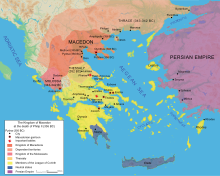
Kingdom of Macedon after Philip’s II death.
Philip redesigned the
army of Macedon
adding a number of variations
to the traditional
hoplite
force to make it far more effective. He
added the
hetairoi
, a well armoured heavy cavalry,
and more light infantry, both of which added greater flexibility and
responsiveness to the force. He also lengthened the spear and shrank the shield
of the main infantry force, increasing its offensive capabilities.
Philip began to rapidly expand the borders of his kingdom. He first
campaigned in the north against non-Greek peoples such as the
Illyrians
, securing his northern border and
gaining much prestige as a warrior. He next turned east, to the territory along
the northern shore of the Aegean. The most important city in this area was
Amphipolis
, which controlled the way into
Thrace
and also was near valuable silver mines.
This region had been part of the
Athenian Empire
, and Athens still considered it
as in their sphere. The Athenians attempted to curb the growing power of
Macedonia, but were limited by the outbreak of the
Social War
. They could also do little to halt
Philip when he turned his armies south and took over most of
Thessaly
.
Control of Thessaly meant Philip was now closely involved in the politics of
central Greece. 356 BC saw the outbreak of the
Third Sacred War
that pitted
Phocis
against
Thebes
and its allies. Thebes recruited the
Macedonians to join them and at the
Battle of Crocus Field
Phillip decisively
defeated Phocis and its Athenian allies. As a result Macedonia became the
leading state in the
Amphictyonic League
and Phillip became head of
the Pythian Games, firmly putting the Macedonian leader at the centre of the
Greek political world.
In the continuing conflict with Athens Philip marched east through Thrace in
an attempt to capture
Byzantium
and the
Bosphorus
, thus cutting off the Black Sea grain
supply that provided Athens with much of its food. The siege of Byzantium
failed, but Athens realized the grave danger the rise of Macedon presented and
under Demosthenes
built a coalition of many of the
major states to oppose the Macedonians. Most importantly Thebes, which had the
strongest ground force of any of the city states, joined the effort. The allies
met the Macedonians at the
Battle of Chaeronea
and were decisively
defeated, leaving Philip and the Macedonians the unquestioned master of Greece.
Empire
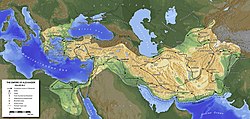
Alexander’s empire at the time of its maximum expansion
Philip’s son,
Alexander the Great
(356–323
BC), managed to briefly extend Macedonian power not only over the central Greek
city-states by becoming
Hegemon
of the
League of Corinth
(also known as the “Hellenic
League”), but also to the
Persian empire
, including
Egypt
and lands as far east as the fringes of
India
. Alexander helped spread the Greek
culture and learning through his vast empire. Although the empire fractured into
multiple Hellenic regimes shortly after his death, his conquests left a lasting
legacy, not least in the new Greek-speaking cities founded across Persia’s
western territories, heralding the
Hellenistic
period. In the partition of
Alexander’s empire among the
Diadochi
, Macedonia fell to the
Antipatrid dynasty
, which was overthrown by the
Antigonid dynasty
after only a few years, in
294 BC.
Hellenistic era
Antipater
and his son
Cassander
gained control of Macedonia but it
slid into a long period of civil strife following Cassander’s death in 297 BC.
It was ruled for a while by
Demetrius I
(294–288
BC) but fell into civil war.
Demetrius’ son,
Antigonus II
(277–239
BC), defeated a Galatian
invasion as a
condottiere
, and regained his family’s
position in Macedonia; he successfully restored order and prosperity there,
though he lost control of many of the Greek city-states. He established a stable
monarchy under the
Antigonid dynasty
.
Antigonus III
(239–221
BC) built on these gains by re-establishing Macedonian power across the region.
What is notable about the Macedonian regime during the Hellenistic times is
that it was the only successor state to the Empire that maintained the old
archaic perception of kingship, and never adopted the ways of the Hellenistic
monarchy. Thus the king was never deified in the same way that Ptolemies and
Seleucids were in Egypt and Asia respectively, and never adopted the custom of
Proskynesis
. The ancient Macedonians during the
Hellenistic times were still addressing their kings in a far more casual way
than the subjects of the rest of the Diadochi, and the kings were still
consulting with their aristocracy (Philoi) in the process of making their
decisions.
Conflict with Rome
Under
Philip V of Macedon
(221–179
BC) and his son
Perseus of Macedon
(179–168
BC), the kingdom clashed with the rising power of the
Roman Republic
. During the 2nd and 1st
centuries BC, Macedon fought a
series of wars
with Rome. Two major losses that
led to the end of the kingdom were in 197 BC when Rome defeated Philip V, and
168 BC when Rome defeated Perseus. The overall losses resulted in the defeat of
Macedon, the deposition of the Antigonid dynasty and the dismantling of the
Macedonian kingdom.
Andriscus
‘ brief success at reestablishing the
monarchy in 149 BC was quickly followed by his defeat the following year and the
establishment of direct
Roman
rule and the organization of Macedon as
the
Roman province of Macedonia
.
Institutions
The political organization of the Macedonian kingdom was a three-level
pyramid: on the top, the King and the nation, at the foot, the civic
organizations (cities and éthnē), and between the two, the districts. The
study of these different institutions has been considerably renewed thanks to
epigraphy
, which has given us the possibility
to reread the indications given us by ancient literary sources such as
Livy and
Polybius
. They show that the Macedonian
institutions were near to those of the Greek federal states, like the
Aetolian
and
Achaean
leagues, whose unity was reinforced by
the presence of the king.

The
Vergina Sun
, the 16-ray star
covering what appears to be the royal burial larnax of Philip II of
Macedon, discovered in Vergina, Greece.
The King
The king
(Βασιλεύς,
Basileús) headed the
central administration: he led the kingdom from its capital, Pella, and in his
royal palace was conserved the state’s archive. He was helped in carrying out
his work by the
Royal Secretary
(βασιλικὸς
γραμματεύς, basilikós
grammateús), whose work was of primary importance, and by the
Council
. The title “king” (basileús) may
have not officially been used by the Macedonian regents until
Alexander the Great
, whose “usage of it may
have been influenced by his ambivalent position in Persia.”
The king was commander of the army, head of the Macedonian religion, and
director of diplomacy. Also, only he could conclude treaties, and, until
Philip V
, mint coins.
The number of civil servants was limited: the king directed his kingdom
mostly in an indirect way, supporting himself principally through the local
magistrates, the epistates, with whom he constantly kept in touch.
Succession
Royal succession in Macedon was hereditary, male,
patrilineal
and generally respected the
principle of
primogeniture
. There was also an elective
element: when the king died, his designated heir, generally but not always the
eldest son, had first to be accepted by the council and then presented to the
general Assembly to be acclaimed king and obtain the oath of fidelity.
As can be seen, the succession was far from being automatic, more so
considering that many Macedonian kings died violently, without having made
dispositions for the succession, or having assured themselves that these would
be respected. This can be seen with
Perdiccas III
, slain by the
Illyrians
,
Philip II
assassinated by
Pausanias of Orestis
,
Alexander the Great
, suddenly died of malady,
etc. Succession crises were frequent, especially up to the 4th century BC, when
the magnate families of Upper Macedonia still cultivated the ambition of
overthrowing the Argaead dynasty and to ascend to the throne.
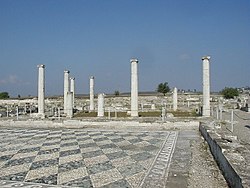
An atrium with a pebble-mosaic paving, in Pella, Greece
Finances
The king was the simple guardian and administrator of the treasure of Macedon
and of the king’s incomes (βασιλικά,
basiliká), which belonged
to the Macedonians: and the tributes that came to the kingdom thanks to the
treaties with the defeated people also went to the Macedonian people, and not to
the king. Even if the king was not accountable for his management of the
kingdom’s entries, he may have felt responsible to defend his administration on
certain occasions: Arrian
tells us that during the
mutiny
of Alexander’s soldiers at
Opis in 324 BC, Alexander detailed the possessions of his father at
his death to prove he had not abused his charge.
It is known from Livy and Polybius that the basiliká included the
following sources of income:
- The mines of gold and silver (for example those of the
Pangaeus
), which were the exclusive
possession of the king, and which permitted him to strike currency, as
already said his sole privilege till Philip V, who conceded to cities and
districts the right of coinage for the lesser denominations, like bronze.
- The forests, whose timber was very appreciated by the Greek
cities to build their ships: in particular, it is known that
Athens
made commercial treaties with
Macedon in the 5th century BC to import the timber necessary for the
construction and the maintenance of its fleet of war.
- The royal landed properties, lands that were annexed to the royal
domain through conquest, and that the king exploited either directly, in
particular through servile workforce made up of prisoners of war, or
indirectly through a leasing system.
- The port duties on commerce (importation and exportation taxes).
The most common way to exploit these different sources of income was by
leasing: the Pseudo-Aristotle
reports in the
Oeconomica
that
Amyntas III
(or maybe Philip II) doubled the
kingdom’s port revenues with the help of
Callistratus
, who had taken refuge in Macedon,
bringing them from 20 to 40
talents
per year. To do this, the exploitation
of the harbour taxes was given every year at the private offering the highest
bidding. It is also known from Livy that the mines and the forests were leased
for a fixed sum under Philip V, and it appears that the same happened under the
Argaead dynasty: from here possibly comes the leasing system that was used in
Ptolemaic Egypt
.
Except for the king’s properties, land in Macedon was free: Macedonians were
free men and did not pay land taxes on private grounds. Even extraordinary taxes
like those paid by the Athenians in times of war did not exist. Even in
conditions of economic peril, like what happened to Alexander in 334 BC and
Perseus in 168 BC, the monarchy did not tax its subjects but raised funds
through loans, first of all by his Companions, or raised the cost of the leases.
The king could grant the atelíē (ἀτελίη),
a privilege of tax exemption, as Alexander did with those Macedonian families
which had losses in the
battle of the Granicus
in May
334
: they were exempted from paying tribute for
leasing royal grounds and commercial taxes.
Extraordinary incomes came from the spoils of war, which were divided between
the king and his men. At the time of Philip II and Alexander, this was a
considerable source of income. A considerable part of the gold and silver
objects taken at the time of the European and Asian campaigns were melted in
ingots and then sent to the monetary foundries of
Pella
and
Amphipolis
, most active of the kingdom at that
time: an estimate judges that during the reign of Alexander only the mint of
Amphipolis struck about 13 million silver
tetradrachms
.
The Assembly
All the kingdom’s citizen-soldiers gather in a popular assembly, which is
held at least twice a year, in spring and in autumn, with the opening and the
closing of the campaigning season.
This assembly (koinê ekklesia
or koinon makedonôn), of
the army in times of war, of the people in times of peace, is called by the king
and plays a significant role through the acclamation of the kings and in capital
trials; it can be consulted (without obligation) for the foreign politics
(declarations of war, treaties) and for the appointment of high state officials.
In the majority of these occasions, the Assembly does nothing but ratify the
proposals of a smaller body, the Council. It is also the Assembly which votes
the honors, sends embassies, during its two annual meetings. It was abolished by
the Romans
at the time of their reorganization of
Macedonia in 167 BC, to prevent, according to
Livy, that a demagogue could make use of it as a mean to revolt
against their authority.
Council (Synedrion)
The Council was a small group formed among some of the most eminent
Macedonians, chosen by the king to assist him in the government of the kingdom.
As such it was not a representative assembly, but notwithstanding that on
certain occasions it could be expanded with the admission of representatives of
the cities and of the civic corps of the kingdom.
The members of the Council (synedroi) belong to three categories:
- The
somatophylakes
(in Greek literally
“bodyguards”) were noble Macedonians chosen by the king to serve to him as
honorary bodyguards, but especially as close advisers. It was a particularly
prestigious honorary title. In the times of Alexander there were seven of
them.
- The Friends (philoi)
or the king’s Companions (basilikoi
hetairoi
) were named for life by the
king among the Macedonian aristocracy.
- The most important generals of the army (hégémones tôn taxéôn),
also named by the king.
The king had in reality less power in the choice of the members of the
Council than appearances would warrant; this was because many of the kingdom’s
most important noblemen were members of the Council by birth-right.
The Council primarily exerted a probouleutic function with respect to the
Assembly: it prepared and proposed the decisions which the Assembly would have
discussed and voted, working in many fields such as the designation of kings and
regents, as of that of the high administrators and the declarations of war. It
was also the first and final authority for all the cases which did not involve
capital punishment.
The Council gathered frequently and represented the principal body of
government of the kingdom. Any important decision taken by the king was
subjected before it for deliberation.
Inside the Council ruled the democratic principles of iségoria
(equality of word) and of parrhésia (freedom of speech), to which even
the king subjected himself.
After the removal of the
Antigonid dynasty
by the Romans in 167 BC, it
is possible that the synedrion remained, unlike the Assembly, representing the
sole federal authority in Macedonia after the country’s division in four
merides.
Regional
districts (Merides)
The creation of an intermediate territorial administrative level between the
central government and the cities should probably be attributed to Philip II:
this reform corresponded with the need to adapt the kingdom’s institutions to
the great expansion of Macedon under his rule. It was no longer practical to
convene all the Macedonians in a single general assembly, and the answer to this
problem was the creation of four regional districts, each with a regional
assembly. These territorial divisions clearly did not follow any historical or
traditional internal divisions; they were simply artificial administrative
lines.
This said, it should be noted that the existence of these districts is not
attested with certainty (by
numismatics
) before the beginning of the 2nd
century BC.
|

















